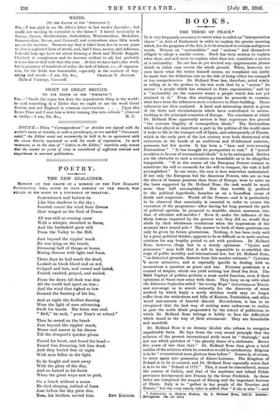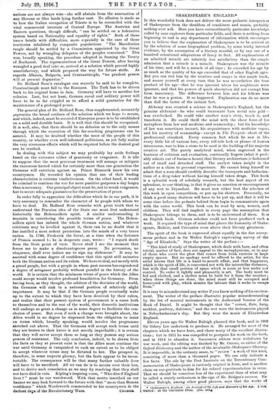BOOKS.
THE TERMS OF PEACE.•
IT is very frequently necessary to insert what is called an "interpretation clams " in Acts of Parliament in order to explain the precise meaning which, for the purposes of the Act, is to be attached to certain ambiguous words. Writers on " nationalities " and " nations " find themselves obliged to adopt a similar course. Much has been written to explain what does, and still more to explain what does not, constitute a nation or a nationality. No one has as yet devised any epigrammatic phrase which in either ease covers the whole ground. When, however, we once know what the writer himself means, no complaint can justly be made that the definition errs on the side of being either too cramped or too comprehensive. Dr. Holland Rose has, therefore, acted wisely in telling us in the preface to his last work that by a " nation " he means " a people which has attained to State organization," and by a " nationality (in the concrete sense) a people which has not yet attained to it." From this starting-point he proceeds to examine what have been the influences most conducive to State-building. Those influences are then analysed. A lucid and interesting sketch is given of the facts and circumstances which have contributed to nation- building in the principal countries of Europe. The conclusion at which Dr. Holland Rose apparently arrives is that experience has proved " the extreme fragility of cosmopolitan ideals." The Nationalism which has played so important a part in the polities of the world since it woke to life at the trumpet-call of Spain, and subsequently of Prussia. which in the early part of the last century were both threatened with extinction at the hands oI an ambitious and ill-informed autocrat, possesses but few merits. It has been a " base and over-weening Nationalism." " It has brought its protagonists to ruin." A " potent revulsion in favour of international ideals " is to be anticipated. Neither are the obstacles to such a revulsion so formidable as to be altogether insuperable. " If in due course all the European Powers consent to substitute the will to reconcile for the will to conquer, the task is hall accomplished." In one sense, the case is here somewhat understated. If not only the European but the American Powers, who are no less the slaves of human passions than those of Europe, were to unite on the basis suggested by Dr. Holland Rose, the task would be much more than half accomplished. But that terrible if, prefixed to the political hypothesis, launches us on a boundless ocean of doubt and conjecture. Would all the Powers—and it is particularly to be observed that unanimity is essential in order to ensure the execution of the programme—after having for long pursued the path of political egotism, be prepared to stumble, almost unawares, into that of altruistic self-sacrifice t Even if, under the influence of the sharp lessons imparted by the present war, they did so, would they abide by their wholesome resolutions when the impressions of the moment have waxed pale / The answer to both of these questions can only be given by future generations. Nothing, it has been truly said by a great political thinker, appears to be so difficult as to make nations continue for any lengthy period to act with prudence. Dr. Holland Rose, however, clings fast to a sturdy optimism. " Cynics and pessimists " may hold that it will be impossible to re-establish the reign of public morality and international law, but Dr. Holland Rose, " on historical grounds, dissents from this sombre estimate." Cynicism As never attractive, and is especially ignoble in dealing with ' so momentous a question as peace and war. Extreme pessimism is a counsel of despair, which can yield nothing but Dead Sea fruit. The Mark Tapleys of politics perform a most useful function, even if their optimism at times rune away with them. They buoy us up with what the Athenian Sophocles called "far-roving Hope" (iroXuvawywrof and encourage us to search earnestly for the discovery of some method by which haply a sorely stricken world may no longer suffer from the wickedness and folly of Kaisers, Treitschkes, and other weird instruments of baneful discord. Nevertheless, it has to be recognized that the best way of making some endeavour to realize in part the noble ideals propounded by the school of politicians to which Dr. Holland Rose belongs is boldly to face the difficulties which stand in the way of their attainment. They are formidable and manifold.
Dr. Holland Rose is no dreamy idealist who refuses to recognize unpalatable facts. He lays down the very sound principle that the solution of the present international strife must be " thorough," and not one which partakes of " the ghastly fiasco of a stalemate. Better five years of war than that." Dr. Holland Rose then gives a brief outline of the solution which he considers would be satisfactory. Belgium is to be " reconstituted more glorious than before." France is, of course, to enter again into possession of Alsace-Lorraine. The Kingdom of Poland is to be re-created, and Dr. Holland Rose especially notes that it is to be the " Poland of 1771." This, it must be remembered, means the cession of Galicia, and that of the maritime and inland Polish provinces incorporated into Prussia by the Great Frederick. In these latter are comprised the seaport of Danzig and the important fortress of Thorn. Italy is to " gather in her people of the Trentino and Trieste," but the very timely rider is added that " if she is wise "—and • Nationality in Modems History. By J Holland ROSS, Litt.D. London : LU. Gd. net4 nations are not always wise—she will abstain from the annexation of any Slovene or Slav lands lying further east. No allusion is made as to how the Italian occupation of Trieste is to be reconciled with the vital commercial interests of Central Europe. The Austrian and Eastern questions, though difficult, " can be settled on a federative system based on Nationality and equality of rights." Both of these issues bristle with difficulties, more especially in the case of those territories inhabited by composite populations. "The Macedonian tangle should be settled by a Commission appointed by the Great Powers, not by wrangling delegates of the peoples concerned." This was, broadly speaking, the procedure adopted in framing the Treaty of Bucharest. The representatives of the Great Powers, after having wrangled a good deal inter se, arrived at a solution which proved highly unsatisfactory, and which prepared the way for future strife. As regards Albania, Bulgaria, and Constantinople, "no prudent person will at present dogmatize."
Dr. Holland Rose's catalogue can scarcely be said to be complete. Constantinople must fall to the Russians. The Turk has to be driven back to his original home in Asia. Germany will have to sacrifice her colonies. Last, but not least, German naval and military power will have to be so far crippled as to afford a solid guarantee for the maintenance of a prolonged peace.
The general plan of Dr. Holland Rose, thus supplemented, accurately represents the broad outlines of the solution which we hope to secure, and which, indeed, must be secured if European peace is to be established on a solid and durable basis. It is well that this should be recognized. It is well, also, that there should be no delusion as to the only means through which the execution of this far-reaching programme can be assured. It may be doubted whether the mass of the people of this country, or whether even well-informed politicians, as yet fully realize the very strenuous efforts which will be required before the desired goal can be reached.
In dealing with this subject we may profitably lay aside feelings based on the extremes either of generosity or vengeance. It is idle to suppose that the most generous treatment will assuage or mitigate the rancorous hatred which for certainly more than one generation the Germans will entertain against us. Prince Bismarck knew his own countrymen. He recorded his opinion that one of their leading characteristics is extreme vindictiveness. On the other hand, it would . be criminal to continue the war for mere punitive purposes a day longer than is necessary. Our principal object must be, not to wreak vengeance, but to secure adequate guarantees for the preservation of peace.
In order fully to appreciate the difficulties which lie in our path, it is very necessary to remember the character of he people with whom we have to deal. Dr. Holland Rose remarks with great truth that to understand the Prussian idea of the State one must first understand historically the Hohenzollern spirit. A similar understanding is requisite in considering the possible terms of peace. The Hohen- zollern spirit has imbued the whole German nation, and whatever criticisms may be levelled against it, there can be no doubt that it has instilled a most ardent patriotism into the minds of a very bravo nation. In 1760, Frederick the Great, at a time when the fortunes 'of Prussia seemed t..) be in desperate case, wrote : " I regard death from the Stoic point of view. Never shall I see the moment that forces me to make a disadvantageous peace. No persuasion, no eloquence, shall ever induce me to sign my dishonour." It may be asserted with some degree of confidence that this spirit still animates both the German nation and its rulers. We have to deal, not merely with a proud people, but with a people in whom past success has engendered a degree of arrogance probably without parallel in the history of the world. It is certain that the minimum terms of peace which the Allies could accept would invoke profound humiliation for Germany. From having been, as they thought, the arbiters of the destinies of the world, the Germans will sink to a national position of relatively alight importance. It may be that if the German people eventually wake up to the extent to which they have been deceived by their rulers, and realize that their present system of government is a curse both to themselves and to the rest of the world, their domestic institutions will undergo so great a change as in some degree to facilitate the con. elusion of peace. But even if such a change were brought about, the Allies would in no degree be dispensed from the obligation to insist on terms which, broadly speaking, would involve the programme sketched out above. That the Germans will accept such terms until they are beaten to their knees is not merely improbable; it is certain that they will never accept them so long as they possess any serious powers of resistance. The only conclusion, indeed, to be drawn from the facts as they at present exist is that the Allies must continue the war until Germany is vanquished to such an extent as to be obliged to accept whatever terms may be dictated to her. The prospect is, therefore, in some respects gloomy, but the facts appear to be -incon- testable. The consequence will be that many further valuable lives will have to be sacrificed. All we can do is to mourn over their loss, and to derive such consolation as we may by resolving that they shall not have died in vain. Kipling's inspiring verse, " Who dies if England lives ? " must be our watchword. With that motto inscribed on our banner we may look forward to the future with that " mere than Roman confidence " which Wordsworth commended to his countrymen in the
darkest daxs.of the Revolutionary Wars. Cnortan.































 Previous page
Previous page